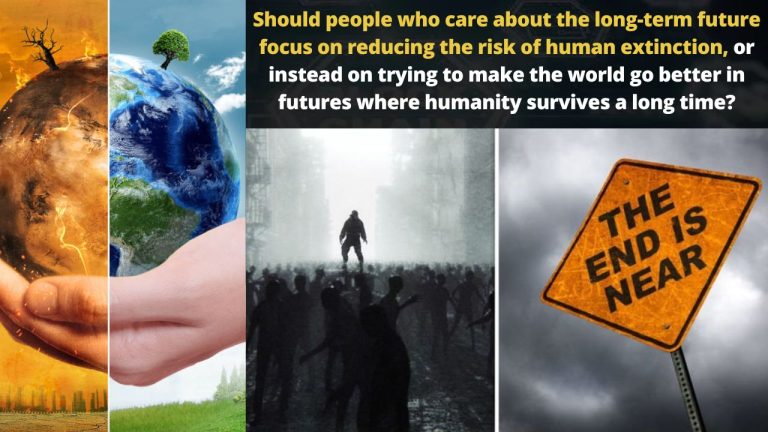"Advertisement"
Should people who care about the long-term future focus on reducing the risk of human extinction, or instead on trying to make the world go better in a future where humanity survives a long time?
Introduction
The course of human civilization is changing, prompting us to consider whether preventing human extinction should be our top priority or actively constructing a better future for future generations.
The question of whether we should concentrate on making the world better for future scenarios in which humanity flourishes or on minimizing the existential risks to our species emerges for those of us who care about the long-term prospects of mankind.
This essay explores the subtleties of this argument, weighing the benefits of both viewpoints and offering a fair strategy that aims to reconcile these seemingly incompatible objectives.
The Imperative of Risk Reduction
The possibility of human extinction hangs over us as a sobering reminder of how short our lives are. Risk management proponents contend that until we ensure our existence, efforts to make long-term changes are pointless.
Periods of upheaval throughout the history of our species, from natural calamities to technological catastrophes, have all had the potential to put an end to human life.
This point of view emphasizes that all other goals become obsolete unless we handle these existential risks, such as nuclear war, pandemics, or uncontrolled artificial intelligence.
Additionally, we must concentrate on reducing these hazards because of our obligation to future generations.
Just as our forefathers set the road for the world we live in today, we cannot avoid the duty of providing a secure and sustainable environment for future generations.
Risk reduction proponents contend that allocating funds to combat these dangers is morally required since it shows a dedication to the continued existence and welfare of all people.
The Vision of Flourishing Futures
On the other hand, proponents of the “making the world better” viewpoint contend that a sole concentration on risk mitigation may result in a myopic strategy that stifles advancement and innovation.
They claim that humanity’s potential resides in creating a vibrant, just, and enriching world rather than simply preventing tragedy.
According to this point of view, making investments in social equality, healthcare, environmental sustainability, and education can all help ensure that mankind doesn’t just survive but also thrives in the future.
This viewpoint is influenced by our evolutionary past and our capacity for adaptation, innovation, and teamwork.
Advocates contend that focusing our efforts on constructive activities promotes resilience and the ability to overcome obstacles.
By actively enhancing the planet, we provide the groundwork for long-term sustainability, ensuring that we have the skills and knowledge necessary to deal with any prospective crises.
The Synergy of Risk Reduction and Progress
A more comprehensive approach acknowledges the symbiotic relationship between risk reduction and advancement rather than considering these two perspectives as fundamentally opposed.
While each viewpoint has benefits of its own, a thorough approach requires a well-balanced synthesis of both.
1. Integrated Planning:
It is possible to effortlessly combine progress-oriented programs with efforts to lower existential dangers.
For instance, creating sustainable technology can promote economic growth while reducing environmental dangers. With this strategy, risk mitigation and the search for a better world are in line.
2. Adaptive Resilience:
Prioritizing risk reduction does not call for a halt to advancement. As a substitute, it calls for us to develop adaptive resilience, in which advancements are made while being keenly aware of potential hazards.
Our progress will be sustainable and risk-aware thanks to this strategy.
3. Education and Innovation:
Stressing progress can help to indirectly reduce hazards. By encouraging education and creative thinking, we give ourselves the tools we need to face new challenges.
The development of new technologies that result from a focus on progress might also help mitigate existential concerns.
4. Ethical Considerations:
Both points of view share the obligation to protect the interests of future generations as their overarching ethical principle.
Understanding this common ground can help develop collaborative tactics that balance risk reduction and advancement.
Conclusion
The interweaving of risk reduction and progress creates a dynamic and intricate story in the broad tapestry of human existence. Protecting against human extinction and fostering a prosperous future are not mutually exclusive goals.
As responsible stewards of the future, we must strike a balance between the necessity of risk mitigation and the possibility of advancement.
The path ahead calls for us to see past ideological barriers and develop a holistic strategy that combines risk reduction with proactive actions to create a better future.
By doing this, we pay homage to the legacy of the past, successfully manage the difficulties of the present, and set sail for a future in which humanity’s survival and prosperity are entwined destinies.
Finally, Thanks For Reading “Should people who care about the long-term future focus on reducing the risk of human extinction, or instead on trying to make the world go better in futures where humanity survives a long time?“.
Must Read:
Essay On How do I see my role in India of my dreams?
Essay On Emerging Issues in Law and the Family
